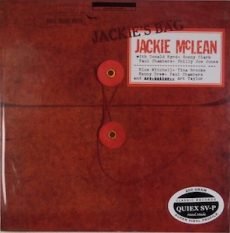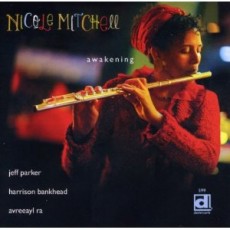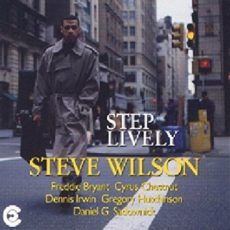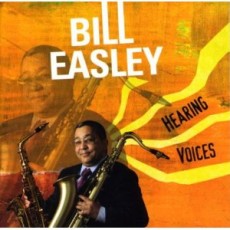
Requisites
Jackie’s Bag ~ Jackie McLean | By Eddie Carter
Alto saxophonist, Jackie McLean, enters this morning’s spotlight with an excellent 1961 hard bop album, Jackie’s Bag (Blue Note BLP 4051/BST 84051). It comprises two sessions from 1959 and 1960, and two all-star ensembles join him. Donald Byrd (tracks: A1-A3), Blue Mitchell (B1 to B3) on trumpet, Tina Brooks (B1 to B3) on tenor sax, Sonny Clark (A1 to A3), Kenny Drew (B1 to B3) on piano, Paul Chambers on bass, Philly Joe Jones (A1 to A3), and Art Taylor (B1 to B3) on drums. The copy I own is the 2008 Classic Records mono audiophile deep groove reissue, sharing the original catalog number.
Side One opens with Quadrangle, the first of five originals by Jackie McLean. It takes off straight into the stratosphere from the start of the quintet’s brisk melody. Jackie takes a sharp corner into an energetic opening solo, then Donald continues navigating traffic in the next lively statement. Philly Joe tackles the final solo vigorously, leading back into the closing chorus. Blues Inn begins with the ensemble’s relaxed theme. McLean opens with an easygoing solo, then Byrd compels the listener to leave their troubles behind in the following statement. Clark has an enjoyable interpretation next, and Paul’s short walk leads the group back into the theme’s restatement and close.
Fidel gets going with Philly Joe’s introduction to the group’s upbeat melody. Donald has the first solo and makes the most of every note. Jackie takes over and swings so passionately that the listener is sure to be tapping his toes and snapping his fingers. Sonny’s rhythmic agility in the closer flows efficiently into the closing chorus and ending. Appointment in Ghana starts the second side with the front line’s introduction segueing into the sextet’s lively melody. McLean leads off and shows he can cook with the best of them. Mitchell adds some bite to the second solo, then Brooks ignites the next reading with plenty of heat. Drew gets the last word ahead of the group’s tasty finale.
A Ballad For Doll is a heartfelt tribute from Jackie to his wife, Dolly. The sextet gently slows things down for a warm and affectionate opening chorus. Kenny shines in the solo spotlight with a delicately beautiful interpretation that builds into the group’s touching climax. Isle of Java by Tina Brooks brings the album to a close, picking up the tempo one last time for Brooks, setting the spirited melody in motion against the sextet. McLean comes out swinging first with a lively interpretation. Mitchell maintains the groove with an effervescent solo. Brooks responds with a statement full of zest. Drew is on the trail of the front line in the following reading, and Chambers gets a moment to shine, preceding the theme’s reprise and fadeout.
Alfred Lion produced Jackie’s Bag, and Rudy Van Gelder managed the recording console. The album’s sound quality is clean and crisp, leaping from the speakers with stunning fidelity and absolutely no background noise. Bernie Grundman mastered the audiophile reissue, and the record was pressed on 200-gram Quiex SV-P Hand Made Super Vinyl. The record is also silent until the music starts. If you’re in the mood for an excellent hard bop album, Jackie’s Bag, by Jackie McLean, is an outstanding entry point to his artistry and discography. The album also offers a vivid picture of the music landscape in the late 1950s and early 1960s, and should make a welcome addition to any jazz fan’s library!
© 2026 by Edward Thomas Carter
More Posts: choice,classic,collectible,collector,history,instrumental,jazz,music,saxophone

Daily Dose Of Jazz…
Nicole Mitchell was born on February 17, 1967 in Syracuse, New York where she was raised until age eight, when her family moved to Anaheim, California. She began with piano and viola in the fourth grade; however, she was classically trained in flute and played in youth orchestras as a teenager. Her initial college major in math was superseded by jazz while in college and took to busking in the streets playing jazz flute. After two years at the University of California, San Diego, in 1987 she transferred to Oberlin College.
In 1990 a move to Chicago saw her playing once again on the streets and working for third World Press and meeting members of the Association for the Advancement of Creative Musicians. Mitchell soon started playing with the all-women ensemble Samana under the AACM umbrella. Over the next several years she moved to New Orleans, became a mother, returned to school earning her BA and Masters, met and extensively began playing with Hamid Drake, then worked with saxophonist David Boykin prior to starting her group the Black Earth Ensemble” and co-hosting the Avant-Garde Jazz Jam Sessions in Chicago.
Releasing her debut album “Vision Quest” in 2001, she has been named “Rising Star” flautist for 2004 -2006 by Down Beat and by Down Beat International Critics Poll in 2010 & 2011. As an educator, Nicole has taught at Northern Illinois, Chicago State, Northeastern Illinois University, Wheaton College and the University of Illinois at Chicago; and has been co-president of the AACM since 2006.
More Posts: flute

Daily Dose Of Jazz…
Steve Wilson was born February 9, 1961 in Hampton, Virginia. As a teenager, Wilson played in various R&B and funk bands and after a year of playing with Stephanie Mills he attended Virginia Commonwealth University. By 1987 he moved to New York, where he established himself as a sideman performing with American Jazz Orchestra, the Mingus Big Band and the Smithsonian Jazz Orchestra among others.
Wilson toured Europe in 1988 with Lionel Hampton and was a member of “Out Of The Blue”, an ensemble featuring young Blue Note musicians. An accomplished flautist and alto and soprano saxophonist, he also plays the clarinet and piccolo and has played and recorded with the Dave Holland Quintet, the Chick Corea Origin Sextet, with Japanese composer Yoko Kanno, has been a member of the Seatbelt’s New York Musicians, the Blue Note 7 and has performed as a soloist for Queen Elizabeth II and Prince Philip.
In 1997 he formed the Steve Wilson Quartet and has performed together for over a decade and produced two CDs. He also heads a larger ensemble, Generations, which performs jazz classic and original compositions.
He has held teaching positions in several schools and Universities, as well as holding jazz clinics, notably at the Manhattan School of Music, SUNY at Purchase, Columbia University, has been artist-in-residence at Hamilton College, Old Dominion and University of North Carolina and continues to maintain a busy career as a session musician both in studio and on tour.

Daily Dose Of Jazz…
Bill Easley: A Life Lived Through Every Era of Modern Jazz
Some musicians pass through jazz history. Bill Easley has lived it—from Harlem jam sessions to Stax Records, from Arctic military bands to Broadway’s brightest lights.
A Prodigy from Upstate New York
Born January 13, 1946, in Orleans, New York, Easley was already a working professional by age thirteen, gigging with his parents and absorbing the craft from the inside. When he arrived in New York City in 1964, he dove straight into the deep end—studying part-time at the legendary Juilliard School while simultaneously earning his real education in Harlem’s uptown jazz clubs, learning directly from the masters who made the music breathe.
An Unexpected Arctic Interlude
Then came an unexpected detour: the draft. Suddenly, Easley found himself stationed in Fairbanks, Alaska, with the 9th Army Band. It wasn’t exactly 52nd Street, but as any true musician knows, you make music wherever you are—even when surrounded by snow instead of skyscrapers.
The Real Education Begins
Back in action by the late ’60s, Easley was playing the legendary rooms that defined the era—Minton’s Playhouse, the Plugged Nickel, The Jazz Workshop, The Hurricane—standing shoulder to shoulder with George Benson. These weren’t just gigs; they were nightly master classes in jazz history happening in real time, each set a conversation with the greats.
Memphis Soul and Stax Swagger
The ’70s brought a southern migration to Memphis, where Easley entered Isaac Hayes’ orbit, laying down tracks at the iconic Stax and Hi Records—the studios where soul music was being redefined. Even while pursuing his formal education at Memphis State University, he was out there every night with big bands and show bands, whatever was swinging.
Then came the gig that changes everything for any jazz musician: touring with the Duke Ellington Orchestra under Mercer Ellington in the mid-’70s. To play that book, to carry that legacy—it’s a responsibility and an honor few ever experience.
The Great White Way Calls
By 1980, Broadway beckoned, and Easley answered. His theater credits read like a greatest-hits compilation: Sophisticated Ladies, The Wiz, Black and Blue, Jelly’s Last Jam, Fosse—the shows that defined an era of musical theater and kept the jazz tradition alive on the world’s most famous stages.
Never Just a Pit Musician
But here’s the thing about Bill Easley: he never stopped being a jazz cat. Between curtain calls, he was in recording studios with pianists Sir Roland Hanna and Mulgrew Miller, organists Jimmy McGriff and Jimmy Smith, vocalist Ruth Brown, and drummers Grady Tate and Billy Higgins. He recorded for respected labels like Sunnyside and Milestone, keeping one foot firmly planted in the jazz tradition even as the other tapped out Broadway rhythms.
Master of Many Voices
Saxophone, flute, clarinet—Easley commands them all with the hard-won wisdom of someone who’s witnessed every chapter of modern jazz unfold firsthand. From bebop to soul jazz, from Broadway pits to intimate club dates, he’s been there, absorbed it, and made it part of his musical DNA.
Still Writing the Story
And the best part? Bill Easley is still out there, still playing, still adding new chapters to a story that now spans six decades and counting. In a world obsessed with the next new thing, there’s something deeply reassuring about a musician who has mastered the art of being present—in every era, in every room, in every note.
That’s not just a career. That’s a life lived in service to the music itself.

Daily Dose Of Jazz…
Ingrid Jensen: From Subway Platforms to the World’s Greatest Stages
Born on January 12, 1966, in North Vancouver, British Columbia, Ingrid Jensen grew up in nearby Nanaimo, Canada, where she first picked up the trumpet as a child. What began as childhood curiosity blossomed into exceptional talent—so much so that scholarship offers poured in. Jensen made her way through Malaspina University before landing at the prestigious Berklee College of Music, where her distinctive voice on the trumpet truly began to emerge.
Hustle and Heart in the Big Apple< Like so many jazz dreamers before her, Jensen arrived in New York City determined to make her mark. Her early days weren't glamorous—she played in subway stations, trumpet case open for tips, honing her chops and building confidence one commuter at a time. It was the kind of apprenticeship that forges character as much as skill, and Jensen emerged from it ready to take on the jazz world.
Breaking Through
Her rise to prominence has been both steady and impressive. Jensen has signed with and released albums on respected labels including Enja, Justin Time, Universal, and ArtistShare. Her debut album, Vernal Fields, featuring drumming legend Lenny White, saxophonist George Garzone, and bassist Larry Grenadier, earned her a Juno Award—Canada’s highest musical honor. She’s been nominated for several more since, cementing her status as one of jazz’s essential voices.
A Musical Life in Motion
Today, Jensen divides her time between leading her own projects and serving as a featured soloist with the Grammy Award-winning Maria Schneider Jazz Orchestra—one of the most celebrated large ensembles in contemporary jazz. She’s also a sought-after educator, guest-teaching at prestigious universities around the world, sharing not just technique but the wisdom gained from decades on the bandstand.
Family Harmony
Music runs deep in the Jensen family. Ingrid occasionally collaborates with her sister, the accomplished saxophonist Christine Jensen, creating performances that showcase not just their individual artistry but the intuitive connection that only siblings can share.
A Who’s Who of Collaborators
ensen’s résumé reads like a jazz encyclopedia. She’s performed with Steve Wilson, Jeff “Tain” Watts, Dr. Lonnie Smith, Gary Bartz, Bob Berg, Terri Lyne Carrington, Geoffrey Keezer, Chris Connor, Clark Terry, Frank Wess, Dr. Billy Taylor, and the DIVA Big Band, among many others. Each collaboration has added another dimension to her musical vocabulary.
Beyond Jazz
Her trumpet has also crossed genre boundaries—she’s performed with British soul singer Corinne Bailey Rae on Saturday Night Live and even backed comedian Denis Leary, proving that great musicianship transcends stylistic borders.
Still Climbing
Ingrid Jensen continues to perform, record, and tour, bringing her warm tone, impeccable technique, and creative spirit to audiences worldwide. From those early days busking in New York subway stations to standing ovations on international stages, her journey is a testament to talent, perseverance, and an unshakeable belief in the power of music.
For anyone who loves the sound of a trumpet played with both virtuosity and soul, Ingrid Jensen is essential listening.
More Posts: bandleader,history,instrumental,jazz,music,trumpet


